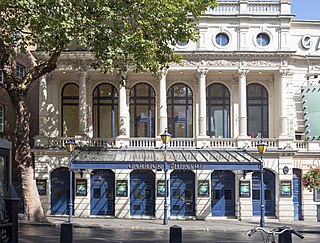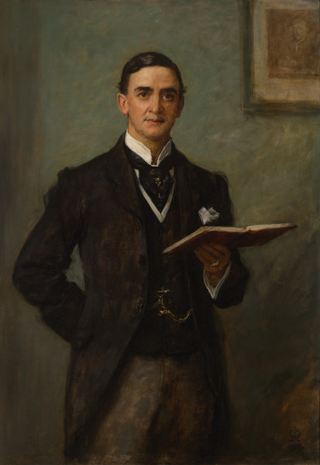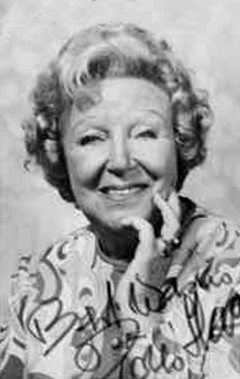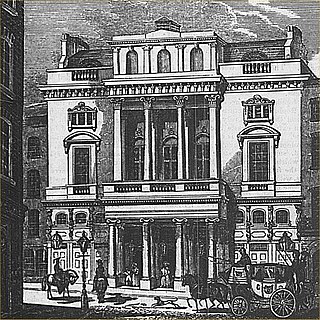
Sir Arthur Wing Pinero was an English playwright and, early in his career, actor.

The Second Mrs. Tanqueray is a problem play by Arthur Wing Pinero. It utilises the "Woman with a past" plot, popular in nineteenth century melodrama. The play was first produced in 1893 by the actor-manager George Alexander and despite causing some shock to his audiences by its scandalous subject it was a box-office success, and was revived in London and New York in many productions during the 20th century.

Dame Agnes Sybil Thorndike, Lady Casson, was an English actress whose stage career lasted from 1904 to 1969.

The Garrick Theatre is a West End theatre, located in Charing Cross Road, in the City of Westminster, named after the stage actor David Garrick. It opened in 1889 with The Profligate, a play by Arthur Wing Pinero, and another Pinero play, The Notorious Mrs. Ebbsmith, was an early success at the theatre. In its early years, the Garrick appears to have specialised in the performance of melodrama. The theatre later became associated with comedies, including No Sex Please, We're British, which played for four years from 1982 to 1986.

Dame Irene Vanbrugh DBE was an English actress. The daughter of a clergyman, Vanbrugh followed her elder sister Violet into the theatrical profession and sustained a career for more than 50 years.

Dame Madge Kendal, was an English actress of the Victorian and Edwardian eras, best known for her roles in Shakespeare and English comedies. Together with her husband, W. H. Kendal , she became an important theatre manager.

Sir John Hare, born John Joseph Fairs, was an English actor and theatre manager of the later 19th– and early 20th centuries.

Doris Breamer Hare MBE was a British actress, comedian, singer, and dancer best known for portraying Mrs. Butler in the British sitcom On the Buses and its film spin-offs, after replacing the original actress Cicely Courtneidge.
The Vertical Hour is a play by David Hare. The play addresses the relationship of characters with opposing views on the 2003 invasion of Iraq, and also explores psychological tension between public lives and private lives.

Julia Emilie Neilson was an English actress best known for her numerous performances as Lady Blakeney in The Scarlet Pimpernel, for her roles in many tragedies and historical romances, and for her portrayal of Rosalind in a long-running production of As You Like It.

Fred Terry was an English actor and theatrical manager. After establishing his reputation in London and in the provinces for a decade, he joined the company of Sir Herbert Beerbohm Tree where he remained for four years, meeting his future wife, Julia Neilson. With Neilson, he played in London and on tour for 27 further years, becoming famous in sword and cape roles, such as the title role in The Scarlet Pimpernel.

Christopher Ravenscroft is an English actor, best known for his recurring role as DI Mike Burden in The Ruth Rendell Mysteries, the ITV adaptation of Ruth Rendell's Inspector Wexford mysteries.

What Every Woman Knows is a four-act play written by J. M. Barrie. It was first presented by impresario Charles Frohman at the Duke of York's Theatre in London on 3 September 1908. It ran for 384 performances, transferring to the Hicks Theatre between 21 December 1908 and 15 February 1909.

Rookery Nook is a farce by the English playwright Ben Travers based on his own 1923 novel. It was first given at the Aldwych Theatre, London, the third in the series of twelve Aldwych farces presented by the actor-manager Tom Walls at the theatre between 1923 and 1933. Several of the actors formed a regular core cast for the Aldwych farces. The play depicts the complications that ensue when a young woman, dressed in pyjamas, seeks refuge from her bullying stepfather at a country house in the middle of the night.

The Gay Lord Quex is an 1899 comedy play by the British playwright Arthur Wing Pinero. It depicts the vicissitudes of a reformed philanderer attempting to embark on monogamy. The original production provoked controversy, some critics finding the plot at best questionable and at worst immoral.
The Linden Tree is a 1947 play by the English dramatist J. B. Priestley. It was first produced at the Duchess Theatre, London on 15 August 1947, and ran for 422 performances. The play had a brief run on Broadway in New York in March 1948 in a production directed by George Schaefer and using costumes designed by Frank Thompson.

Minnie Gertrude Ellis Jeffreys was an English actress, best known for her comedy roles.

Julia Goulding is an English actress who has played Shona Platt on the ITV soap opera, Coronation Street, since 2016.

Ada Ferrar was a British actress of the late Victorian and Edwardian eras.


















